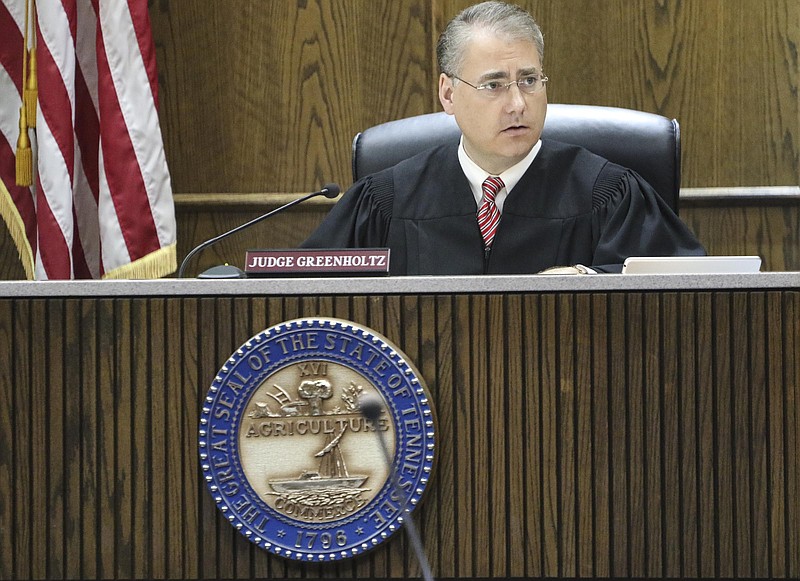A convenience store in College Hill Courts shut down Thursday after prosecutors convinced a judge it had become a public nuisance and a hotbed of criminal activity.
"[Westside Shop] is the site of a disproportionate amount of illegal activity," Hamilton County District Attorney General Neal Pinkston wrote in a 47-page petition. "Between Jan. 1, 2014, and April 1, 2016, officers from the Chattanooga Police Department have responded to the store over 200 times for complaints that include disorders, fights, narcotics violations, robberies, shootings and other criminal offenses."
Officers, deputies and codes enforcement employees padlocked the shop, part of a storefront in one of the city's 17 public housing developments, around lunchtime. Westside owner Salma Ambo could not be reached for comment Thursday. But she can fight the nuisance abatement during a hearing May 2 at 8:30 a.m. before Hamilton County Criminal Court Judge Tom Greenholtz, who approved a temporary order of Pinkston's petition.
"The owners can remedy it," said defense attorney Bill Speek. "But they have to show some plan to counterbalance the criminal activity. They'd have to have some sort of plan to reopen."
Westside is the only store within walking distance of many poor black families who don't have the resources or transportation to buy food elsewhere, activists and some community members said Thursday.
"As this is being spun by Pinkston and the Chattanooga Police Department, it's crime deterrence," said Ash-Lee Woodard Henderson, an executive at the Highlander Center for Education and Research in East Tennessee. "What's real is, this is a time when black, working-class communities are being swiftly gentrified."
Census data from 2015 shows 66 percent of people in the College Hill Courts ZIP Code are black. The facility, which has about 500 units, is tucked off Grove Street. In 1938, federal funds were used to pay for its construction.
Henderson and other community members fought in 2012 to keep the city from selling College Hill Courts to Purpose Built, an Atlanta-based nonprofit organization that planned to revitalize the area by razing the public housing. The petition is another attempt to over-police minorities who don't receive the benefits of city spending in the name of going after drug dealers, Henderson said.
"We've been out there every two weeks for months now, giving out free produce," Henderson said. "And this last week, hundreds of people were there before we could even get the food off the truck - because there's such little access to food out there. Is there harm and crime being created? Absolutely. But we don't see them shutting down Ooltewah's Walmart. Or Signal Mountain stores. And drugs are just as evident there."
Mayor Andy Berke's office did not comment Thursday, and the Chattanooga Police Department said it would leave all comments to the Hamilton County District Attorney's Office.
Spokeswoman Melydia Clewell said Pinkston is aware of the need for better food access for Westside residents, "and that the recent closing of Buehler's [Market in downtown Chattanooga] has essentially cut off all access for anyone who doesn't own a car."
"I cannot speak to the amount of food versus drugs being sold by the Westside Shop, but that should be made public during court proceedings," she wrote in an email. "We are working to make churches and social service agencies aware of the extent of the problem and will do whatever we can to make sure residents are provided access to groceries."
Clewell couldn't comment further on a pending case. But others questioned how the shutdown would benefit the College Hill Courts community.
"Here's the thing," said attorney Chrissy Mincy, who is representing several men against a gang injunction Pinkston's office is pursuing in East Lake Courts. "Is it the business owners? The business was providing a service to this neighborhood. The neighborhood is in public housing. They already have very [little] access to services. And to shut down a business further cuts this community off from just obtaining their basic needs."
Pinkston's petition says the store has "No Loitering" signs posted, but that employees and the owner do not enforce them and allow drug deals to happen on the sidewalk and inside the store.
"At times, the owner and store employees have been uncooperative with law enforcement efforts to curb this activity," the petition reads.
Mincy also pointed out that 69 of the 295 police responses were traffic stops in the area. Another 18 were for "suspicious people," and 21 were for "suspicious activity." And, she said, the calls for service have been declining from 104 in 2014 to 67 in 2015 and 2016 to just six in the first four months of 2017.
Contact staff writer Zack Peterson at zpeterson@timesfreepress.com or 423-757-6347. Follow him on Twitter @zackpeterson918.
